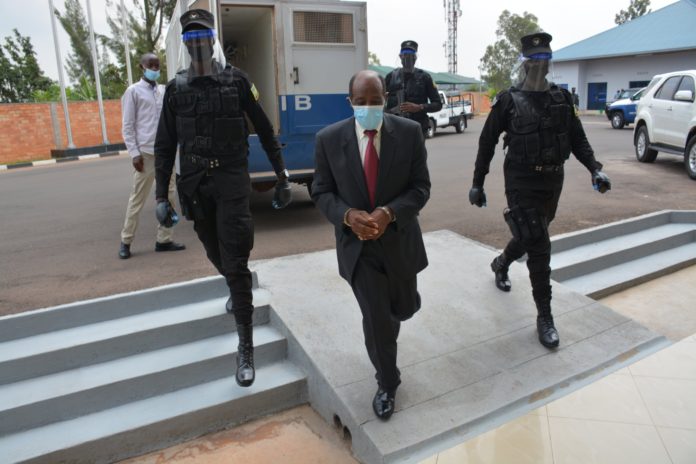General Paul Kagame is presently vulnerable in donor countries that relentlessly support him, no matter what atrocities he commits in Rwanda and the Great Lakes. Among the top three financiers of the Kagame regime – the United States, the United Kingdom, and the European Union – the US can be flipped from supporting Kagame if human rights activists can launch a more aggressive and focussed campaign to isolate the regime.
There are two main reasons why Kagame is far more vulnerable in the US than in the UK and the EU. First, there is bipartisan fatigue of Kagame’s maneuvers in the two chambers of the US Congress. Second, the Joe Biden Administration appears to be less inclined to embrace Kagame, unlike the two previous Democratic Party-led administrations of Bill Clinton and Barack Obama.
Bipartisan fatigue of Kagame’s maneuvers
When Kagame kidnapped Paul Rusesabagina from Dubai, members of the United States Congress indicated that they were tired of Kagame’s endless human rights abuses. American congressional leaders wrote Kagame a strongly-worded letter in the following unequivocal terms:
“We write to express our grave concern with the manner in which your government extrajudicially transferred Mr. Rusesabagina from the United Arab Emirates to Rwanda and then immediately placed him in solitary confinement and charged him with multiple crimes, including terrorism. As your government is aware, U.S. deportation law provides a clear, legal procedure to deport persons for various crimes, including engaging in acts of terrorism…Given this record of Rwandans being deported from the United States when the legal standards are met, your government’s resort to the extrajudicial transfer of Mr. Rusesabagina demonstrates a disregard for U.S. law and suggests a lack of confidence in the credibility of the evidence against him.
We wish to underscore the breadth of bipartisan support in the U.S. Congress for your government to return Mr. Rusesabagina. Our government is monitoring his condition closely.”
The letter was signed by 37 members of US Congress from both the Democratic Party and the Republican Party. This is a most welcome bipartisan response to the regime, which no doubt, was not expecting such a strong pushback.
The Joe Biden Administration appears to be distancing itself from Kagame
In the just-ended Leaders Summit on Climate hosted by US President Joe Biden, Kagame was not among the 40 leaders that participated in the virtual meeting of April 22 and 23, 2021. The five African presidents invited were President Ali Bongo Ondimba, Gabon; President Félix Tshisekedi, the Democratic Republic of the Congo; President Uhuru Kenyatta, Kenya; President Muhammadu Buhari, Nigeria; and President Matamela Cyril Ramaphosa, South Africa. That Kagame was not invited to the climate summit is in sharp contrast to the Obama years. In 2016, for example, the then Secretary of State, John Kerry attended the 28th Meeting of the Parties to the Montreal Protocol held in Kigali, Rwanda. Fast forward to April 2021, Kagame was omitted from the list.
What Rwandan US-based human rights activists and supporters need to do is to rally around Rusesabagina
Kagame is far more vulnerable than ever before. The kidnapping of Rusesabagina has spectacularly backfired. This is the time for the US-based activists to launch an aggressive mobilizing campaign among the US Congress members to persuade them to further isolate Kagame and his regime. He must understand that kidnapping people or “disappearing” them have serious consequences. Begin with the 37 US Congress members that signed the letter to Kagame. They are as follows:
- JAMES E. RISCH, United States Senator
- JAMES P. MCGOVERN, Member of Congress
- PATRICK LEAHY, United States Senator
- ROBERT MENENDEZ, United States Senator
- CHRISTOPHER H. SMITH, Member of Congress
- JOHN CORNYN, United States Senator
- MARCO RUBIO, United States Senator
- KIRSTEN GILLIBRAND, United States Senator
- RON WYDEN, United States Senator
- SHERROD BROWN, United States Senator
- CHRISTOPHER A. COONS, United States Senator
- ELIOT L. ENGEL, Member of Congress
- CORY A. BOOKER, Member of Congress
- DEAN PHILLIPS, Member of Congress
- STEVE CHABOT, Member of Congress
- JEFFREY A. MERKLEY, United States Senator
- BENJAMIN L. CARDIN, United States Senator
- SHELDON WHITEHOUSE, United States Senator
- SUSAN M. COLLINS, United States Senator
- TAMMY DUCKWORTH, United States Senator
- CHRIS VAN HOLLEN, Member of Congress
- MICHAEL MCCAUL, Member of Congress
- KAREN BASS, Member of Congress
- TED W. LIEU, Member of Congress
- JOAQUIN CASTRO, Member of Congress
- JAMIE RASKIN, Member of Congress
- STEVE COHEN, Member of Congress
- AL GREEN, Member of Congress
- GREGORY W. MEEKS, Member of Congress
- ANNA G. ESHOO, Member of Congress
- RON WRIGHT, Member of Congress
- LLOYD DOGGETT, Member of Congress
- JOE WILSON, Member of Congress
- GREG WALDEN, Member of Congress
- WILL HURD, Member of Congress
- JAN SCHAKOWSKY, Member of Congress
- TED S. YOHO, Member of Congress.
As for me, David Himbara, I hereby volunteer to mobilize the US Congressman, Chris Smith, who previously hosted two congressional hearings on Rwanda in which I gave testimony. We can count on Chris Smith to support this cause.
































































